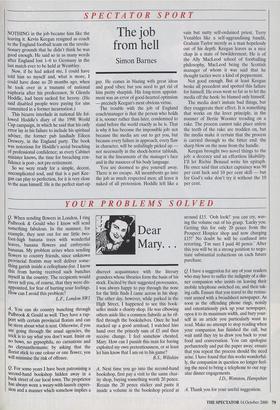SPECTATOR SPORT
The job from hell
Simon Barnes
NOTHING in the job became him like the leaving it. Kevin Keegan resigned as coach to the England football team on the revolu- tionary grounds that he didn't think he was good enough. He said so in as many words after England lost 1-0 to Germany in the last match ever to be held at Wembley.
Now, if he had asked me, I could have told him so myself and, what is more, I could have done so 20 months ago, when he took over in a tsunami of national euphoria after his predecessor, St Glenda Hoddle, had been sacked for heresy. (He said disabled people were paying for sins committed in a former incarnation.) This bizarre interlude in national life fol- lowed Hoddle's diary of the 1998 World Cup campaign, in which he said that his only error lay in his failure to include his spiritual adviser, the former pub landlady Eileen Drewery, in the England party. The book was notorious for Hoddle's serial breaching of professional confidence; as every Cabinet minister knows, the time for breaching con- fidence is post-, not pre-retirement.
So we were ready for a simple, decent, uncomplicated soul, and that is a part Kee- gan can play to perfection, for it is very close to the man himself. He is the perfect start-up guy. He comes in blazing with great ideas and good vibes; but you need to get rid of him pretty sharpish. His long-term appoint- ment was an error of good-hearted optimism — precisely Keegan's most obvious virtue.
The trouble with the job of England coach/manager is that the person who holds it is, sooner rather than later, condemned to stand before the world exactly as he is. That is why it has become the impossible job: not because the media are out to get you, but because every failure in approach, every flaw in character, will be unfailingly picked up not necessarily in the shock-horror tabloids, but in the lineaments of the manager's face and in the nuances of his body language.
You are doomed to give yourself away. There is no escape. All incumbents go into the job as much respected men; all leave it naked of all pretension. Hoddle left like a vain but nutty self-ordained priest, Terry Venables like a self-aggrandising bandit, Graham Taylor merely as a man hopelessly out of his depth. Keegan leaves as a nice chap in a state of bewilderment. He is of the Ally MacLeod school of footballing philosophy, MacLeod being the Scottish manager of whom it was said that he thought tactics were a kind of peppermint.
Not good enough. But at least Keegan broke all precedent and spotted this failure for himself. He-even went so far as to let the media off the hook: he blamed only himself.
The media don't imitate bad things, but they exaggerate their effect. It is something that works on the lever principle, in the manner of Bertie Wooster treading on a rake. The process cannot take place unless the teeth of the rake are trodden on, but the media make it certain that the process is carried through to the bitter end: the sharp blow on the nose from the handle.
Keegan brought two novel things to the job: a decency and an effortless likability. I'll let Richie Benaud write his epitaph. He once said that cricket captaincy was 90 per cent luck and 10 per cent skill — but for God's sake don't try it without the 10 per cent.


















































































 Previous page
Previous page